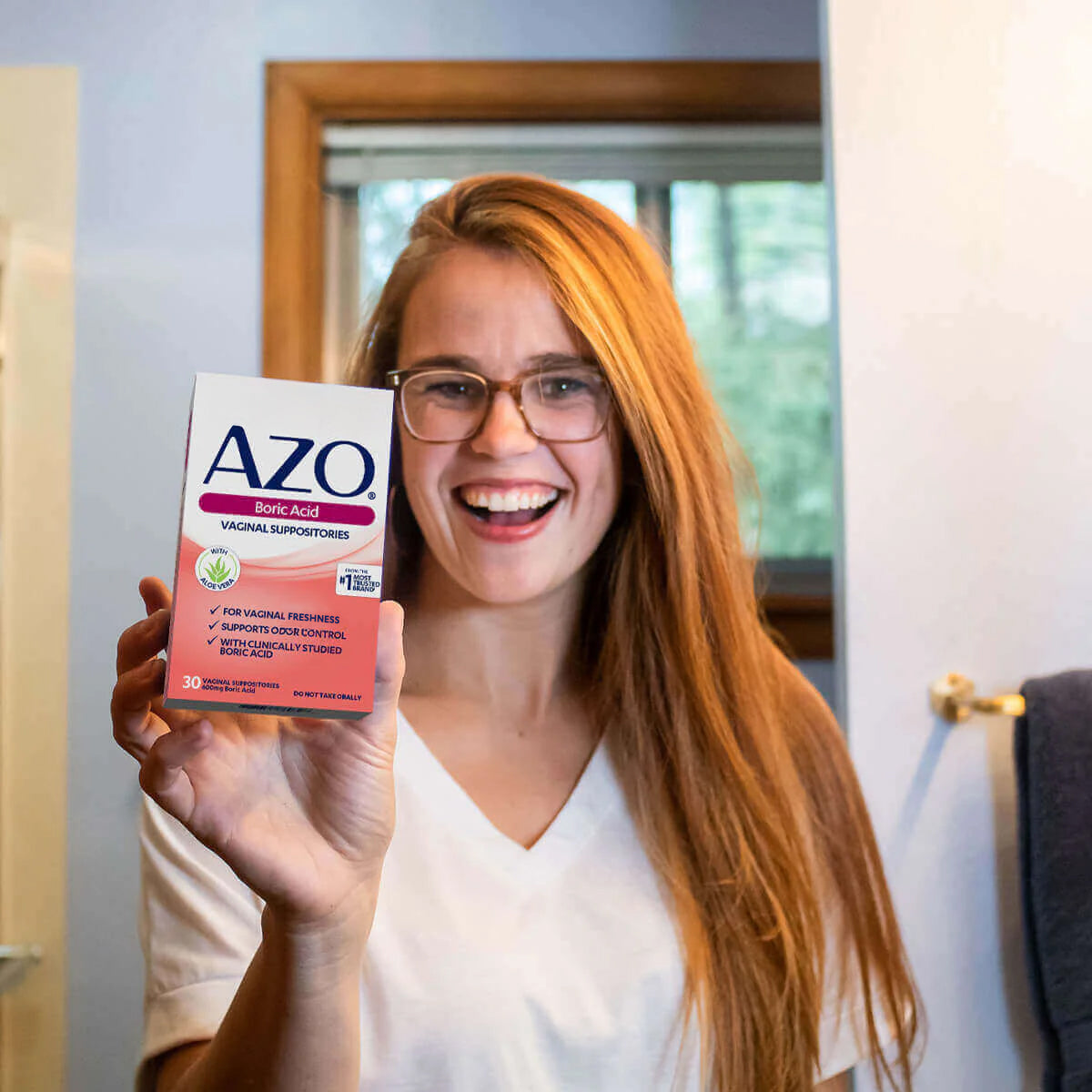Last Updated on January 6, 2025
Pregnant women should not take azo due to potential risks to the fetus. Azo is not recommended during pregnancy.
Pregnancy is a delicate period where women must pay extra attention to their health and avoid any medications that could harm the baby. Azo, a popular over-the-counter medication for urinary tract infections, is not recommended for pregnant women due to potential risks to the developing fetus.
The active ingredient in azo, phenazopyridine, has not been proven safe during pregnancy and could potentially cause harm. It is essential for pregnant women to consult their healthcare provider before taking any medications to ensure the safety of their unborn child. While azo can provide relief for urinary discomfort in non-pregnant individuals, it is crucial to prioritize the health of both the mother and baby during pregnancy and seek alternative solutions recommended by a medical professional.

Credit: azoproducts.com
Related: Can Azo Affect A Pregnancy Test?
Understanding The Safety And Risks
Pregnancy is an exciting and joyous time in a woman’s life. However, it also comes with certain challenges and concerns. One common concern is the use of medications during pregnancy. Many women wonder if it is safe to take azo while pregnant.
In this section, we will explore the safety and potential risks of using azo during pregnancy.
What Is Azo And Its Common Uses?
- Azo is an over-the-counter medication that is commonly used to alleviate symptoms of urinary tract infections (utis) and other urinary discomforts.
- It contains an active ingredient called phenazopyridine, which helps to relieve pain, burning, and urgency associated with utis.
- Azo is available in various forms, including tablets, capsules, and urinary pain relief pills.
Is It Safe For Pregnant Women?
- Azo is generally not recommended for use during pregnancy without consulting a healthcare professional.
- While there is limited research available on the use of azo during pregnancy, some healthcare providers may still prescribe it if the potential benefits outweigh the risks.
- Pregnant women should always consult their healthcare provider before using azo or any other medication.
Potential Risks And Precautions
When it comes to using azo during pregnancy, there are several potential risks and precautions to consider:
- Limited research: The safety of azo during pregnancy has not been extensively studied, so its effects on the developing fetus are not well-understood.
- Potential risks to the fetus: Azo can pass through the placenta and reach the developing fetus, potentially causing harm. It is important to weigh the risks and benefits before using azo during pregnancy.
- Allergic reactions: Some individuals may be allergic to phenazopyridine, the active ingredient in azo. Allergic reactions can range from mild skin rashes to severe anaphylaxis. It is crucial to seek immediate medical attention if any signs of an allergic reaction occur.
- Interactions with other medications: Azo may interact with certain medications, including anticoagulants, increasing the risk of bleeding. It is crucial to inform your healthcare provider about all the medications you are taking to avoid potential interactions.
The use of azo during pregnancy is a topic that should be discussed with a healthcare professional. While it may be prescribed in certain cases, its safety and potential risks to the developing fetus are not yet fully understood. Always consult with your healthcare provider before using any medication during pregnancy to ensure the well-being of both mother and baby.
Alternatives To Azo During Pregnancy
Pregnancy is a delicate time, and it’s important to consider the safety of any medication or supplement before using it. While azo can be an effective over-the-counter treatment for urinary tract infections (utis) and yeast infections, it contains the active ingredient phenazopyridine, which may not be suitable for pregnant women.
If you’re pregnant and experiencing discomfort from a uti or yeast infection, there are alternative options available to provide relief. Here are some natural remedies and over-the-counter alternatives to consider:
Related: Can You Do Hip Thrusts While Pregnant?
Natural Remedies For Utis And Yeast Infections
When it comes to managing utis and yeast infections during pregnancy, natural remedies can be a safe and effective option. These remedies may help alleviate symptoms and support the healing process:
- Drinking plenty of water: Staying hydrated can help flush out bacteria and promote urinary tract health.
- Cranberry juice or supplements: Cranberries contain compounds that may prevent bacteria from adhering to the urinary tract walls, reducing the risk of infection.
- Probiotics: Taking probiotics or consuming foods rich in beneficial bacteria can help restore the balance of good bacteria in the body and prevent the overgrowth of harmful yeast.
- Warm compress: Applying a warm compress to the affected area may help relieve discomfort and reduce inflammation.
- Proper hygiene: Maintaining good hygiene practices, such as wearing cotton underwear, avoiding douching, and keeping the genital area clean, can help prevent and manage infections.
Over-The-Counter Options Without Phenazopyridine
If you prefer an over-the-counter option to alleviate the symptoms of a uti or yeast infection, there are alternatives available that do not contain phenazopyridine. These products can be found at most pharmacies and may provide relief without any potential risks to your pregnancy:
- Antibacterial wipes or creams: These products can help soothe external discomfort caused by utis or yeast infections.
- Antifungal creams or suppositories: Over-the-counter antifungal treatments can be used to address yeast infections. Look for products that do not contain phenazopyridine.
- Pain relief: While phenazopyridine is commonly used to relieve the pain associated with utis, it’s best to avoid it during pregnancy. Instead, you can try acetaminophen, which is generally considered safe for pregnant women when taken as directed.
Consulting A Healthcare Professional
When dealing with any health concern during pregnancy, it’s essential to consult a healthcare professional before considering any treatment options. They can provide guidance based on your specific situation and provide recommendations tailored to your needs. Your healthcare provider will be able to assess the severity of your symptoms and determine the best course of action for you and your baby.
Remember, the content provided here is for informational purposes only and should not replace professional medical advice. Always consult with a healthcare professional before taking any medication or starting any treatment during pregnancy.
Dealing with utis and yeast infections while pregnant can be uncomfortable, but there are alternative options available to help manage your symptoms safely. By exploring natural remedies, over-the-counter alternatives without phenazopyridine, and seeking guidance from a healthcare professional, you can find relief while prioritizing the well-being of both you and your baby.
Navigating Utis And Yeast Infections During Pregnancy
Symptoms And Common Concerns During Pregnancy
During pregnancy, it’s not uncommon for women to experience urinary tract infections (utis) and yeast infections. These conditions can be uncomfortable and worrisome, but it’s important to know that they are treatable and usually pose no harm to the baby.
Here are some key points to keep in mind:
- Utis: Symptoms of a uti in pregnancy can include frequent urination, a burning sensation during urination, cloudy or strong-smelling urine, and lower abdominal pain. It’s important to note that some pregnant women may not experience any symptoms, making it crucial to undergo regular urine tests during prenatal check-ups to detect utis.
- Yeast infections: Yeast infections are also common during pregnancy, caused by an overgrowth of the candida fungus. Symptoms may include itching, burning, and a thick, white, cottage cheese-like discharge. Hormonal changes and an increase in blood sugar levels can contribute to the development of yeast infections during pregnancy.
Tips For Prevention And Self-Care
While it’s not always possible to prevent utis or yeast infections during pregnancy, there are some steps you can take to minimize your risk and manage symptoms:
- Staying hydrated: Drinking plenty of water helps flush bacteria out of your urinary tract, reducing the likelihood of developing a uti.
- Good hygiene practices: Maintain proper hygiene by wiping from front to back after using the toilet to prevent bacteria from spreading from the rectal area to the urethra.
- Pee before and after intercourse: Emptying your bladder before and after sexual activity can help flush out any bacteria that may have entered the urethra.
- Choose cotton underwear: Wearing breathable cotton underwear can help prevent excessive moisture and promote optimal vaginal health.
- Avoid irritants: Steer clear of scented soaps, bubble baths, and douches, as they can disrupt the natural balance of bacteria in the vagina and increase the risk of yeast infections.
Related: Can You Do Jumping Jacks While Pregnant?
When To Seek Medical Advice And Treatment Options
While self-care measures can provide relief, it’s essential to consult your healthcare provider if you experience symptoms of a uti or yeast infection. They can assess your condition and recommend appropriate treatment options based on your specific needs. Some key points to consider include:
- Medical advice: If you suspect a uti or yeast infection, reach out to your healthcare provider as soon as possible. They may recommend urine and vaginal swab tests to confirm the diagnosis.
- Treatment options: Treatments for utis generally involve a course of antibiotics prescribed by your healthcare provider. For yeast infections, antifungal medications, such as topical creams or oral tablets, are commonly used to alleviate symptoms and resolve the infection.
- Safety of azo: While azo is an over-the-counter medication often used to relieve uti symptoms in non-pregnant individuals, it’s essential to consult your healthcare provider before taking any medication during pregnancy. They can provide guidance on the safety and suitability of using azo or alternative treatments.
Remember, early detection and appropriate treatment are crucial for managing utis and yeast infections during pregnancy. By staying informed and seeking medical advice when needed, you can navigate these common concerns and prioritize your health and well-being during this special time.
Frequently Asked Questions On Can Pregnant Women Take Azo?
Can Pregnant Women Take Azo For Urinary Tract Infections?
Yes, pregnant women can take azo for urinary tract infections, but it’s important to consult with their healthcare provider first.
Is Azo Safe To Use During Pregnancy?
Azo is generally safe to use during pregnancy, but it’s recommended to consult with a healthcare provider before taking any medication.
What Are The Potential Risks Of Taking Azo While Pregnant?
While azo is considered safe for most pregnant women, there may be potential risks, so it’s important to consult with a healthcare provider.
Are There Any Alternative Options To Azo For Pregnant Women?
Yes, there are alternative options available for pregnant women with urinary tract infections, such as drinking plenty of water and practicing good hygiene. It’s best to consult with a healthcare provider for guidance.
Conclusion
It is important to consider the potential risks and benefits when it comes to taking azo during pregnancy. While azo is generally considered safe for use in non-pregnant individuals, there is limited research available regarding its safety during pregnancy. It is always recommended to consult with a healthcare professional before starting any medication, especially during pregnancy.
They will be able to weigh the potential risks and benefits and provide personalized advice based on the individual’s specific situation. If you are experiencing urinary tract symptoms or discomfort during pregnancy, it is best to discuss alternative options with your healthcare provider.
Remember, the health and well-being of both the mother and the developing baby should always be the primary concern. By making informed decisions and seeking professional guidance, pregnant women can ensure the safety and health of themselves and their baby.











